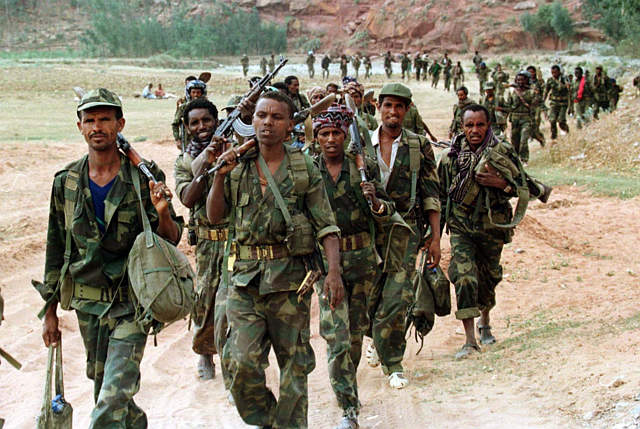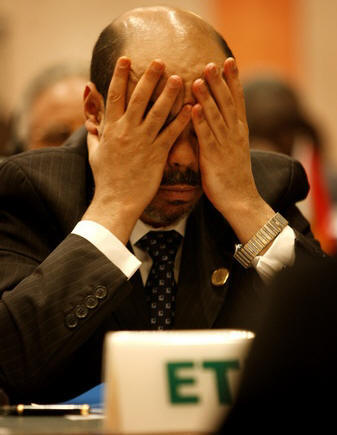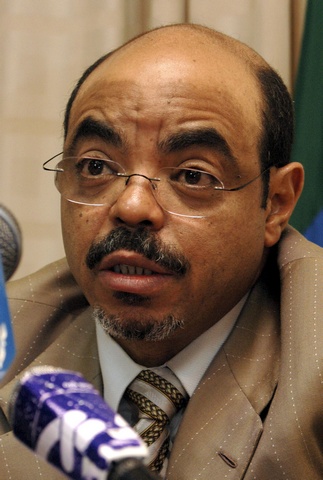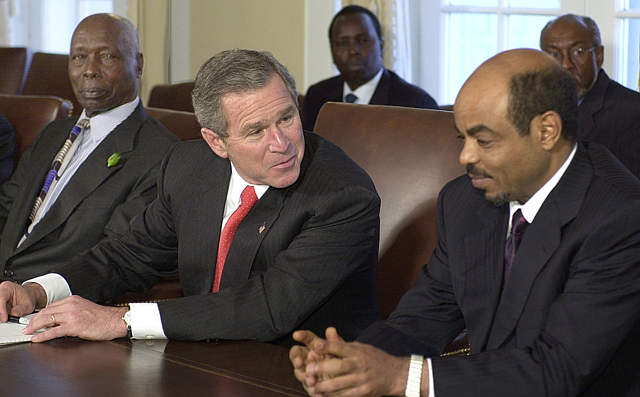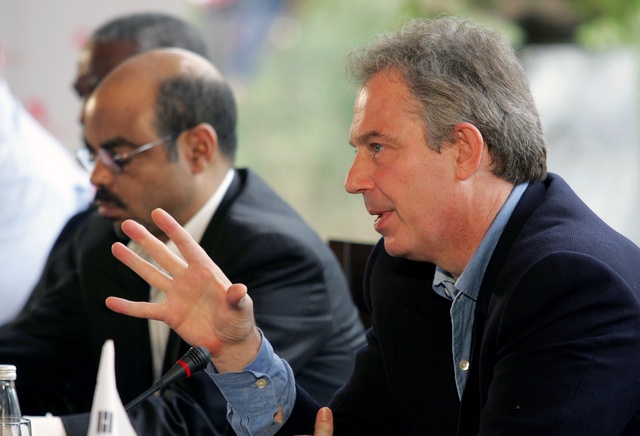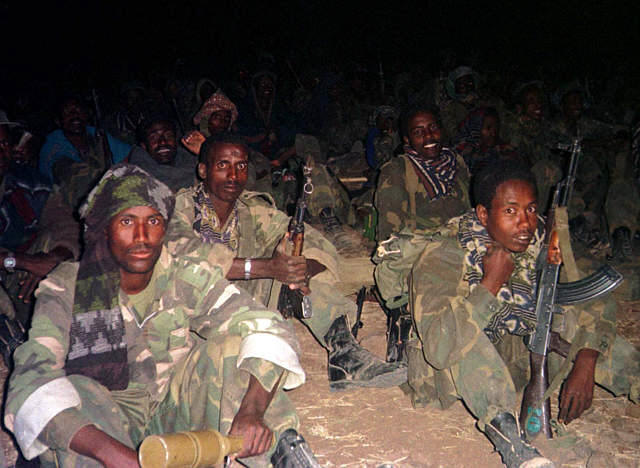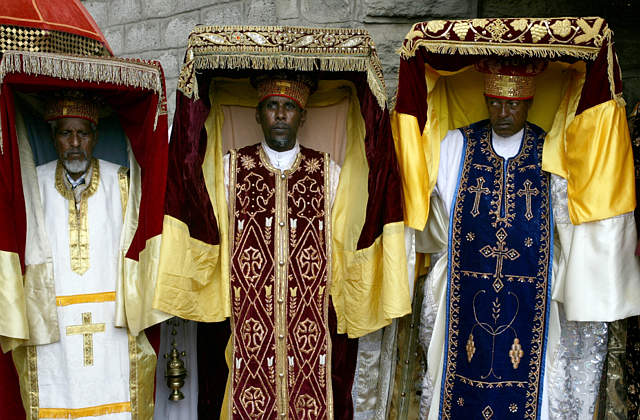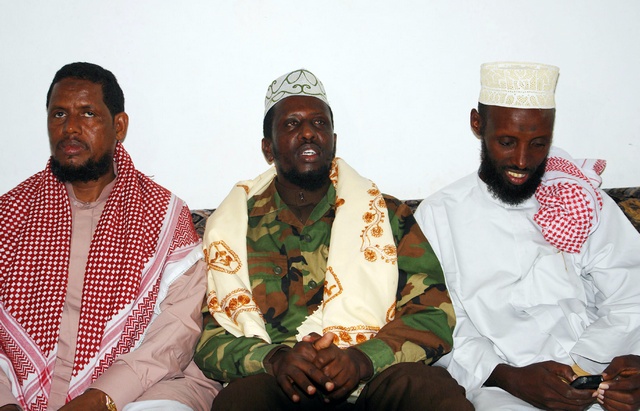|
The Ethiopian Factor |
|
THE ETHIOPIAN FACTOR IN THE RISE OF UIC
U.S. President George W. Bush (C) chats with Prime Minister of Ethiopia Meles Zenawi (R) during a meeting with Kenyan President Daniel Arap Moi (L) for talks on combatting international terrorism, December 5, 2002 at the White House. Bush said that the U.S. was continuing, with help of African leaders, to hunt down al Qaeda terrorists and eliminating them. REUTERS/Mike Theiler
British Prime Minister Tony Blair (R) speaks at a news conference of the Progressive Governance Summit flanked by Ethiopian Prime Minister Meles Zenawi at the Didimala game lodge in Hammanskraal, 50 km (31 miles) north of the capital Pretoria, South Africa February 12, 2006. REUTERS/Howard Burditt
The Ethiopia Factor in the Rise of the Union of Islamic Courts
John Mbaria December 05, 2006
Nairobi, Dec 05, 2006 (The East African/All Africa Global Media) -- As the US and Britain spearhead a campaign to have Somalia declared a haven for terrorists linked to al Qaeda, a profile of the Union of Islamic Courts prepared by the International Crisis Group gives a humane face to the organisation.
The Profile of the Council of Somali Islamic Courts, by Matt Bryden, a consultant with the ICG on Somalia, portrays the Islamic Courts as well organised outfits that, contrary to popular opinion, have a well thought out military strategy for taking control of and restoring order in a country characterised by 15 years of anarchy.
They emerged partly from the collapse of law and order following the fall of the Siad Barre regime in 1991, but also from the entrenchment of Islamic religion and practice, which have a 1,000 year-long history in the country.
Initially, the courts operated merely as a community response to lawlessness and violence in much of southern Somalia.
Largely unknown then, most Islamic courts were started along clan lines, were headed by a respected local Sheikh, and supported by leading business people within the communities.
The Islamic Courts have a well thought out campaign of not only restoring hope in the country but also ensuring that they gain monopoly in the use of force. For instance, Bryden says, each time they secure victory over militias loyal to warlords, they not only acquire the heavy weapons and vehicles of the enemy, but also ensure that their forces attain military dominance in an area, they maintain a low profile but are able to respond rapidly to any threat.
"As a result, no other group - whether clan-based, commercial or factional - is able to muster sufficient arms to successfully challenge the courts."
He adds that they are also not vindictive to their captives and usually invite them to join their ranks or to support their programmes. Once they accept the offer, the militias are then sent to training camps "for re-orientation and further training."
Bryden says early prototypes of the courts include such outfits as Sheikh Ali Dheere's, established in north Mogadishu in 1994 and the Beled Weyene court initiated in 1996.
The warlords who controlled different parts of Mogadishu and the country did not take kindly to the courts' interference on their turfs and soon, the Islamists found themselves in open competition with them and with other political forces, forcing them to either scale back their activities or close entirely.
But as anarchy reigned and attempts to restore peace failed, the Islamic Courts were re-established afresh between 1998 and 2000. Before then, individual courts operated more or less as separate entities.
But they soon saw the sense in working together through a joint committee to promote security. This move was initiated by four of the courts - Ifka Halan, Circolo, Warshadda and Hararyaale - who formed a committee to co-ordinate their affairs, to exchange criminals from different clans and to integrate security forces.
The current leader of the Council of Islamic Courts, Sheikh Hassan Dahir Aweys, is said to have been instrumental in this initiative. As a former leader and military commander of al-itihaad al-Islaami (an organisation accused by the US of being a terrorist outfit), he had sought to have the courts involved in political activism.
He is also said to have been the brains behind the conversion of the joint committee into a Sharia Implementation Committee. This was around the same time the Transitional Federal Government was formed under the then leadership of Abdiqasim Salat Hassan.
Unfortunately, the Courts and the TFG did not agree and the Courts were forced to remain low key between 2001 and 2004.
Evidently not one to give up, Aweys is said to have used the opportunity to seek financial and military support in the Middle East. When he returned, he laid the foundation of the Union of Islamic Courts in his home town of Galgudud, central Somalia.
During the peace process in Nairobi, Bryden says, Aweys and colleagues managed to convince other groups that the process was heading towards the establishment of a regime friendly to Ethiopia, Somalia's arch-enemy.
This development could not be allowed and with other like-minded people, Aweys commenced the formation of the Supreme Council of Islamic Courts of Somalia headed by Sheikh Shariff Sheikh Ahmed.
Shaped as an outfit for political negotiation, the Supreme Council found favour among many of the courts so that between 2004 and 2005, its membership rose to 11.
Bryden says the "Ethiopian factor" in TFG was to lead to an unofficial split in the transitional government with the "Mogadishu Group" headed by the Speaker establishing links with the Courts, whose anti-Ethiopia sentiments it shared. The other group remained in Johar.
Soon, however, the Union of Islamic Courts found itself in open conflict with the warlords in Mogadishu, especially after the latter agreed to be used by the US Central Intelligence Agency to fight the Courts through the warlords' Alliance for the Restoration of Peace and Counter-terrorism.
The war between the Courts and the warlord alliance started in January, when militias loyal to warlord Bashir Raghe clashed with the family of Aboker Omar, the most influential financial backer of the Courts.
Bryden reports that Raghe had captured several "technicals" (pick-up trucks mounted with heavy machine guns) belonging to Omar and refused to hand them over, saying that the US would not permit him to release such material to "terrorists".
Soon, the stage was set for a bigger conflict, which became imminent when the Courts launched a pre-emptive attack on the warlord alliance to the west of Mogadishu.
Following several months of fighting, the warlords were defeated. "It was a victory so rapid and comprehensive that it took even the Courts by surprise," Bryden reports.
The success in Mogadishu seems to have given the Courts the impetus they needed to wage a wider campaign for the control of Somalia.
But there have been hiccups to the campaign. From the outset, the courts seemed unified, but the truth is that they do not represent a commonality even in religious terms, he says.
While the ICG's reports on Somalia have provided insight into events in the country, they have occasionally angered Somalis in the diaspora, who regard the ICG as an agent of Western governments out to make things worse in the country.
Bill Anashe, the editor of Burtinle Online News, a Somali information outfit, for instance accuses the ICG of putting out factually erroneous reports "intended solely to destabilise the political cohesiveness of our people."
© 2006 AllAfrica, All Rights Reserved
We Are Being Attacked By the Jihadists" Meles Told Parliament
by By Dagnachew Teklu December 05, 2006
Addis Ababa, Dec 05, 2006 (The Daily Monitor/All Africa Global Media) -- In what amounted to be a declaration of war, Prime Minister Meles Zenawi on Thursday said his country had completed preparations to fight Somali Islamic movements after efforts for dialogue failed.
Having presented to the Parliament on current peace and security issues in the region yesterday, the Premiere moved a motion pressing the House to approve it saying it was high time the country responded to threats from jihadists from neighboring Somalia.
"We are being attacked by the Jihadist in Somalia. They are mobilizing various forces to take measures against us. We so far have remained patient to the attacks .We have not responded .But we need this House to have a common consensus on every preparation against the Jihadist in Somalia. This motion is important,"Meles told the House.
"The country has the full right to defend itself against any threat ... To exercise this right we have been preparing for this kind of response, because it is our responsibility," he said.
"The government has completed that kind of preparation," Meles announced..
The Premier meant to have his motion endorsed by the parliament,yesterday, but his move was met with objection from opposition MPs who demanded that the matter at hand be studied in detail before any move by the parliament to endorse it.
"We need to have a common consensus on this issue before the House endorsed it as it was presented .It is a national issue and we all need to have a common consensus whatever is requested to the House," Professor Beyene Petros of United Ethiopian Democratic Forces (UEDF) said.
Bulcha Mideksa, head of Oromo Federalist Democratic Party (OFDP) backed UEDF's stand on the matter under discussion and said there was no need to hurry.
He said the House was aware of the clear and present danger from UIC.
But he warned that the house should not rush to making decisions.
"We need to take the issue seriously. Otherwise it will isolate the country from the international community. That is why we are asking the matter to be seen seriously before any endorsement,"Bulcha said.
Meles however told the House that it was important that there House approve his proposal as, he said, the Eritrea-backed Islamists were mobilizing forces close to the Ethiopian border.
Meles said he was not declaring war against Somalia and remains committed to peaceful resolution of political conflicts in the region. It was the ICU's dangerous and persistent moves against Ethiopia that he wants his government to quail.
"We are not declaring war against Somalia even to the Jihadist or its people. We still stand to solve the issue by peaceful means. But the other side (UIC) engaged in taking steps against Ethiopia. They openly say time and again that they are preparing to invade our country. This is an invasion. This is a clear and present danger to Ethiopia. We have the right and obligation to defend ourselves," Meles insisted.
The Premiere also indicated no other country in the region was under a danger as clear and present as Ethiopia is.
Meles also explained to the parliament that the UICs were not willing to solve differences with Ethiopia through dialogue during the past days.
"We are telling them to mind their steps they take against Ethiopia. But they do not take our words seriously, thinking Ethiopia will not respond with out UN permission and other things. But the country has the right to defend itself based on existing international law; with out UN's or others' permission others," he added.
Meles also presented to the parliament on issues related to the current social and economic issues of the country.
Meanwhile, the Somali militia on Thursday said it was ready to fight Ethiopian " invaders, sparking fears " of an all-out war.
Ethiopia has also made clear it will defend the internationally backed government and itself from attack by the Islamists, some of whom are accused of links with al-Qaeda and have refused to attend peace talks.
© 2006 AllAfrica, All Rights Reserved
Ethiopian soldiers rest on the way to the war front outside the town of Adigrat February 17. Ethiopia has the backing of the international community in its demand that Eritrean troops withdraw from contested border territories, and says it has no need to gloat over its victories by presenting bloodied Eritrean bodies to the media.
Ethiopian orthodox priests carry so-called "tabots" on their heads, engraved wooden or stone slabs containing the Ten Commandments under layers of rich cloth during annual Epiphany celebrations called "Timket" of the Ethiopian Orthodox Church in Addis Ababa January 20, 2004. "Timket", the greatest Ethiopian festival of the year is to commemorate Jesus Christ's baptism in the Jordan River by John the Baptist. REUTERS/Wolfgang Rattay
Somali Islamist leader Sheikh Sharif Ahmed (C), flanked by Sheikh Yusuf Indho-adde (L) and Sheikh Abdulkadir Ali Omar (R), address a news conference at Villa Somalia, former presidential palace in the capital Mogadishu, October 9, 2006. Somalia's powerful Islamists on Monday declared holy war against Horn of Africa rival Ethiopia, which they accused of invading Somalia to help the government briefly seize a town controlled by pro-Islamist fighters. REUTERS/Shabele Media (SOMALIA)
|
